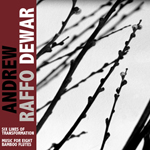|
|
 |
Dusted Reviews
Artist: Andrew Raffo Dewar Album: Six Lines of Transformation & Music for Eight Bamboo Flutes Label: Porter Review date: Jan. 8, 2009 |

|
|
|
 |
Partial erasure is composer and former Dusted contributor Andrew Raffo Dewar’s modus operandi on the two similarly lengthy but drastically different-sounding pieces that comprise this new CD.
Six musicians play on “Six Lines Of Transformation”; four wind players, one bassist, one percussionist. Since Dewar is an improviser himself (he plays soprano saxophone on Bill Dixon’s recent 17 Musicians in Search of a Sound: Darfur), it makes sense that he would engage people like Matt Bauder, Nate Wooley and Katherine Young, who easily straddle the composed-improvised musical divide, to realize his own work, but the transformations he puts the piece through are all written out. That’s not necessarily a problem in itself unless you’re an improv fundamentalist, but one wonders how much life this piece might have picked up if more decisions were allotted to the players. The music moves through four iterations of the material, each rendered different by what Dewar has erased and rewritten. The first run-through feels like it was written by notating a series of one-way sweeps across a keyboard. By the third, dissenting whispers challenge the music’s progress; squelchy brass kisses and burrowing reed lines stand out where holes have been left in the structure. But no matter how much the music changes, it feels reined in, as though knowing where things are headed takes away the urgency of getting there.
“Music For Eight Flutes” couldn’t sound more different. Composed and performed in Bali by an equal mix of American and Indonesian composers playing suling bamboo flutes on several passes through a single melody, it promises to be rather daunting. Are you up for eight flutists a-tooting for 40 minutes? In practice, it’s quite absorbing. Inspired by cross-patterns formed by winds blowing from two directions across a lake, but also mirroring a potential clash of cultures, Dewar has set his mixed ensemble on a collision course. The flutes play en masse rather than in harmony, generating different tones that create richness where one might expect overwhelming consistency. Dewar’s transformations of the material almost seem beside the point. It’s the moment-to-moment changes in sonority, not melody, that maintain interest.
By Bill Meyer
|







